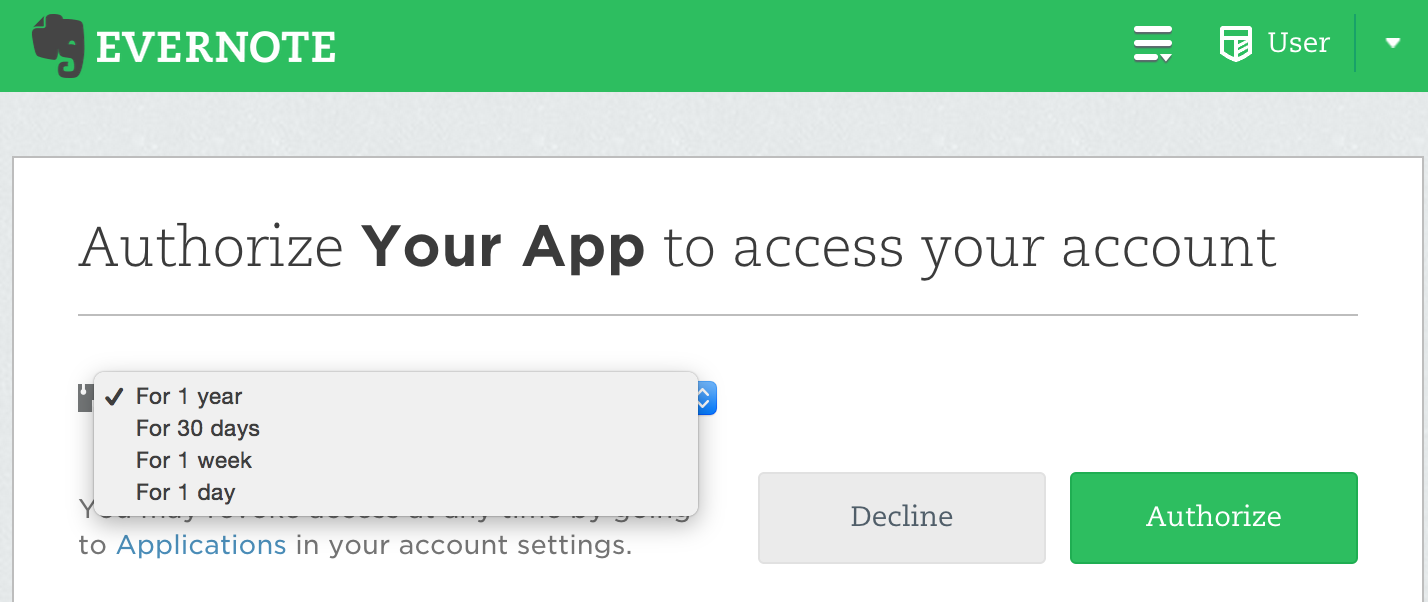What is OpenID Connect?
Evernote's web service API provides secure access for your applications using the same network communications that are used by Evernote's own client software, including the ability to create, read, update and delete notes, notebooks and tags. As kentaro says, there is no official Evernote REST API. There is a user-created REST API someone wrote as as wrapper around the Java Thrift API. I've not used it so I can't vouch for it personally. Also note, however, that while there is OAuth-based authentication (your #1 requirement), your #2 requirement is not possible.
OpenID Connect 1.0 is a simple identity layer on top of the OAuth 2.0 protocol. It allows Clients to verify the identity of the End-User based on the authentication performed by an Authorization Server, as well as to obtain basic profile information about the End-User in an interoperable and REST-like manner.
OpenID Connect allows clients of all types, including Web-based, mobile, and JavaScript clients, to request and receive information about authenticated sessions and end-users. The specification suite is extensible, allowing participants to use optional features such as encryption of identity data, discovery of OpenID Providers, and session management, when it makes sense for them.
See https://openid.net/connect/faq/ for a set of answers to Frequently Asked Questions about OpenID Connect.
How is OpenID Connect different than OpenID 2.0?
OpenID Connect performs many of the same tasks as OpenID 2.0, but does so in a way that is API-friendly, and usable by native and mobile applications. OpenID Connect defines optional mechanisms for robust signing and encryption. Whereas integration of OAuth 1.0a and OpenID 2.0 required an extension, in OpenID Connect, OAuth 2.0 capabilities are integrated with the protocol itself.
Specification Organization
The OpenID Connect 1.0 specification consists of these documents: Alcatel composite rndis interface driver download.
- Core – Defines the core OpenID Connect functionality: authentication built on top of OAuth 2.0 and the use of Claims to communicate information about the End-User
- Discovery – (Optional) Defines how Clients dynamically discover information about OpenID Providers
- Dynamic Registration – (Optional) Defines how clients dynamically register with OpenID Providers
- OAuth 2.0 Multiple Response Types – Defines several specific new OAuth 2.0 response types
- OAuth 2.0 Form Post Response Mode – (Optional) Defines how to return OAuth 2.0 Authorization Response parameters (including OpenID Connect Authentication Response parameters) using HTML form values that are auto-submitted by the User Agent using HTTP POST
- RP-Initiated Logout – (Optional) Defines how a Relying Party requests that an OpenID Provider log out the End-User
- Session Management – (Optional) Defines how to manage OpenID Connect sessions, including postMessage-based logout and RP-initiated logout functionality
- Front-Channel Logout – (Optional) Defines a front-channel logout mechanism that does not use an OP iframe on RP pages
- Back-Channel Logout – (Optional) Defines a logout mechanism that uses direct back-channel communication between the OP and RPs being logged out
- OpenID Connect Federation – (Optional) Defines how sets of OPs and RPs can establish trust by utilizing a Federation Operator
Two implementer’s guides are also available to serve as self-contained references for implementers of basic Web-based Relying Parties:

- Basic Client Implementer’s Guide – Simple subset of the Core functionality for a web-based Relying Party using the OAuth code flow
- Implicit Client Implementer’s Guide – Simple subset of the Core functionality for a web-based Relying Party using the OAuth implicit flow
A protocol migration specification has been finalized:
- OpenID 2.0 to OpenID Connect Migration 1.0 – Defines how to migrate from OpenID 2.0 to OpenID Connect
Finally, see the working group status page for the new work the OpenID Connect working group is engaged in.
The OpenID Connect specifications and implementer’s guides they are built upon are shown in the diagram below. Click on the boxes in the diagram to view the specification.
Participation in the Working Group
The easiest way to monitor progress on the OpenID Connect 1.0 Specification is to join the mailing list at https://lists.openid.net/mailman/listinfo/openid-specs-ab.
Please note that while anyone can join the mailing list as a read-only recipient, posting to the mailing list or contributing to the specifications requires the submission of an IPR Agreement. More information is available at https://openid.net/intellectual-property. Make sure to specify the working group as “OpenID AB/Connect”, because this group is a merged working group and both names must be specified.
Evernote Rest Api Download
For more details on participating, see the OpenID Connect Working Group Page.
Implementations
The Libraries page lists libraries that implement OpenID Connect and related specifications.
Interop Testing
Interop testing for OpenID Connect Federation implementations is under way. If you are interested in participating in the interop activities, join the OpenID Federation Interop mailing list.
Evernote Rest Api
Status
Final OpenID Connect specifications were launched on February 26, 2014.
The certification program for OpenID Connect was launched on April 22, 2015.
Final OAuth 2.0 Form Post Response Mode Specification was approved on April 27, 2015.
OpenID Certification for RPs was made available to all in August 2017.
Second Implementer’s Draft of OpenID Connect Federation Specification Approved on January 8, 2020.
To Integrate Google Contacts and Evernote with DreamFactory, book a demo with DreamFactory. DreamFactory is an open source API gateway that can handle all of your customized integrations.
What is DreamFactory?
DreamFactory is the premier API lifecycle management platform. It eliminates duplication of effort in code development, documentation, and testing by allowing you to model your application easily and create fully-documented REST API. This enables agile application developers to build, deploy and maintain new applications faster.
DreamFactory's capabilities go well beyond integrating APIs with a wide range of authentication providers. Additional security-related features include:
- Automated API key management
- Granular role-based access controls, allowing you to restrict APIs to specific endpoints and even limit access by HTTP method
- Request volume limiting on a per-service, per-user, and even a per-endpoint basis
- The ability to extend endpoints using custom scripting, allowing for data masking, input validation, geofencing, and much more
What is Google Contacts?
Google Contacts, part of Google's suite of business-oriented web apps, helps you keep track of all your contacts. You can quickly contact anyone in your Google Contacts list with the information already stored in their Gmail inboxes. The service includes an address book and card-based interface for adding information to contacts.
You can create groups within your Google Contacts list and store individual notes and multimedia attachments on each contact.
Evernote Rest Api Tutorial
What is Evernote?
Evernote is an app designed as a place to brainstorm, outline, collect, create and share your ideas across all of your devices, anywhere, anytime. Users can use Evernote to; Jot down ideas & create to-do lists, save photos, receipts & snapshots, create task lists & reminders, or collect sets of notes in notebook stacks.
Evernote is a web-based application and uses the Evernote desktop and mobile apps to work across many devices. Evernote seamlessly syncs your information from all devices so you can find them anywhere while keeping your data secure.
Evernote Rest Api Example

Evernote Rest Api Json
Integrate Google Contacts and Evernote with DreamFactory now! It's just one click away
To speak with one of our integration experts, book a demo with DreamFactory, or request a demo using the form below. You can also get started right now by registering for a 14-day free trial.
